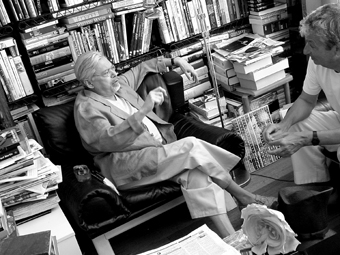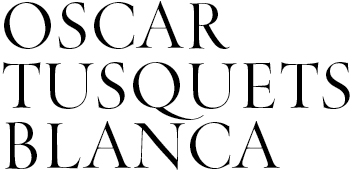Barcelona
Guillermo Cabrera Infante. Writer. Gibara, Oriente, Cuba, 1929
Oscar (Tusquets: could there be any other Oscar?) is to Barcelona what Barcelona is to the Oscar. There cannot be another Catalan (or Barcelonese, which amounts to the same) artist who is so much a part of Barcelona – with the possible exception of Gaudí, whom Oscar idolises. In other words, he sees him as an idol to love, venerate and revere. He has even named one of his furniture masterpieces gaulino, which of course, he writes with a capital G. I cannot say whether Oscar loves Barcelona more than he loves architecture – which he also writes with a capital A. Oscar is also an extraordinary painter, but it is not his painting that I want to talk about now. (In all likelihood, I will not talk about his architecture either.) / I want to talk about Oscar’s relationship with Barcelona, not only with the city’s architecture but with the city itself, which just about everyone is crazy about. (Excepting possibly Eduardo Mendoza, whose novels, however, are full of the city as a genius loci.) Before, Barcelona was wont to look towards Europe. Now, it looks to itself. With the ever intrusive eye of the tourist that I am not - I detest being a tourist – when I see the city I become a voyeur who sees it not as beautiful and distant but rather rendered intimate as a result of the trip. / For Oscar (who has restored and designed buildings and houses in Barcelona), living in Barcelona does not mean merely inhabiting it, but rather living it. (I said I was going to talk about Oscar and Barcelona and here I am only writing - though for me writing is talking - and vice versa, a word which in Spanish makes us think of verse but which in English begins with vice: the vice of vice versa.) For Oscar, Barcelona. (And now I discover that I am not describing but am merely the scribe who digresses, digression being somewhat short of a virtue and much more than a vice - although Laurence Sterne, master of many and student of all, calls digression the sun of conversation - or should that be the sun of writing?) / Which reminds me of Barcelona’s sun – which I did not see on my first visit there in December 1964. But then again, the sun can always be found sparkling in her architectural jewels. Coming from Brussels on that first occasion, all I saw was sólo lluvia, como si el cielo llorara (“only rain, as if the sky was crying”). (Oh, the undying poetry of songs!) / I came to talk, to write about Oscar, whose character is reflected in a story I often tell (my friends call my stories, anecdotes). Victoria, Miriam Gómez and myself (and Oscar, of course) went for dinner one night to the house of a renowned cookery columnist, famous for her books on cuisine, especially Mediterranean cuisine. The night was to be memorable, not for the culinary demonstration, which was a fiasco, but because the Great Gourmet (or writer of cookery books) served up spaghetti a la marinera.* Which, like almost any mariner that sets out to sea and returns after shipwreck, failed miserably. (For us.) Oscar, however, saved the situation and in his best English (with just the right accent) asked for bread. There was no bread (and I thought of Marie Antoinette: “let them eat cake”) and Oscar thundered (or at least, did something more than exclaim), like an Avenging Zeus: “But Madame, you realise that Mediterranean food without bread is not food?”
* Pasta a la Marx, the chef of the Groucho Club who invented spaghetti in a bicarbonate sauce - a dish that cures the indigestion it causes.

With Guillermo Cabrera Infante in his apartment. London, 2002







